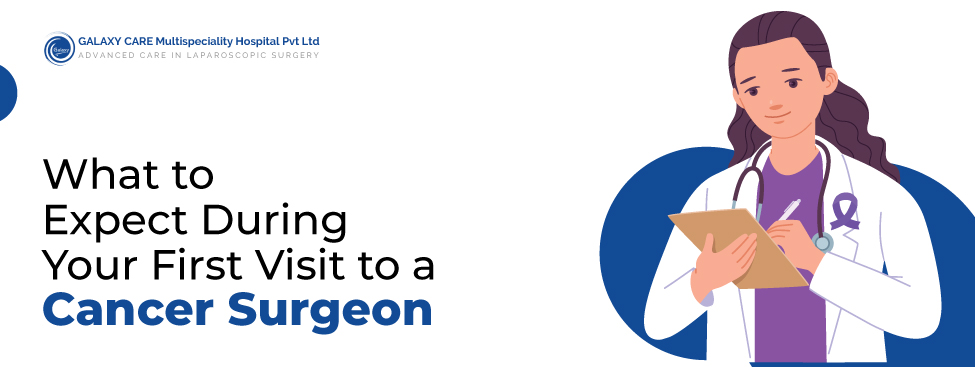
What to Expect During Your First Visit to a Cancer Surgeon in Pune
Have you recently been referred to a cancer surgeon and are feeling anxious about your first visit? It’s natural to feel nervous and have many questions running through your mind. What will the doctor say? What tests will be conducted? Will there be a definitive diagnosis? Take a deep breath – visiting a cancer surgeon is a step forward toward getting the answers you need.
At Galaxy Care Hospital, our cancer surgeons in Pune understand that this is undoubtedly a serious situation. Knowing what to expect during your initial consultation can help ease your concerns and prepare you mentally, emotionally, and physically for this journey. Let’s walk through everything you need to know, step by step, so you feel more confident and informed during your first appointment.
Before Your Appointment: Preparing the Right Way
Preparation before seeing a cancer surgeon is crucial. Begin by gathering all necessary medical records. This may include:
- Pathology reports or biopsy results, if they have already been performed.
- Imaging studies such as X-rays, CT scans, or MRIS.
- Blood test reports, if any.
If you’ve had preliminary treatment or seen other doctors, note their names and carry prescription details. Make a list of any symptoms you’re experiencing, even those you think might not be very significant, and write down any questions or concerns. This helps ensure you don’t forget anything important during the consultation.
You should also prepare mentally and emotionally. It’s normal to feel overwhelmed, so consider bringing a trusted family member or friend with you to provide support and help you recall everything discussed during the appointment.
What to Bring
When visiting a cancer surgeon in Pune, ensure you bring the following:
- Medical records and test reports.
- Your mediclaim information/documentation (if applicable).
- Any referrals provided by your primary care physician or specialist.
As for attire, wear comfortable, loose-fitting clothes, as you might need to undergo a physical examination. Avoid wearing too much jewelry or complicated clothing that may make undressing for tests or exams inconvenient.
Consultation with Cancer Surgeon
Your consultation will likely begin with an introduction and a detailed discussion of your medical history. The surgeon will want to know about:
- Existing symptoms – when they began and how they’ve progressed.
- Your family history of cancer or other chronic illnesses.
- Lifestyle factors such as smoking, alcohol consumption, or occupational hazards.
Don’t hold back any information, even if you think it might not be relevant. Cancer surgeons are trained to analyze patterns and symptoms that might not appear obvious initially, so providing complete and honest details is crucial.
Physical Examination
After reviewing your medical history, the surgeon may proceed with a physical examination. This could involve checking for any palpable lumps, changes in skin texture, or abnormalities in specific areas of concern. Keep in mind that the examination will vary based on the suspected type of cancer.
For example, a physical evaluation for breast cancer might involve examining the breasts for lumps or irregularities. For abdominal cancers, the surgeon might examine the stomach area for swelling or tenderness. The physical exam is a vital step in narrowing down potential diagnoses.
Emotional Support and Communication
It’s common to feel unsure about what lies ahead, but communication is key. Don’t hesitate to express your fears and anxieties to the surgeon. They understand the emotional toll of this journey and will often provide reassurances or connect you with counseling services if needed. Recognize that you don’t have to face this challenge alone; our medical infrastructure is built on patient-centric care. Give yourself credit for taking this bold step. Seeking help shows strength, and understanding your options can give you clarity and peace of mind.
Treatment Plan Overview
If a diagnosis of cancer is made, your surgeon will walk you through a personalized treatment plan. Depending on the type and stage of cancer, treatments may include:
- Surgery: To remove the tumor or affected tissues.
- Radiation therapy: To destroy cancer cells using high-energy rays.
- Chemotherapy: To target cancer cells with medication.
- Targeted therapy or immunotherapy: Advanced methods to fight specific forms of cancer.
Your cancer surgeon will explain which treatments are appropriate in your case and discuss their benefits, side effects, and success rates. If surgery is recommended, you’ll be informed about the type of procedure, recovery time, and expected outcomes.
Follow-Up Appointments and Support
The visit doesn’t end with the diagnosis or treatment discussion. A good cancer surgeon will schedule follow-ups to monitor your progress and address any side effects. These sessions might also involve adjustments to your treatment plan or additional tests.
Support is available throughout this journey in the form of multidisciplinary teams. At Galaxy Care Hospital in Pune, we also offer care from dietitians, physical therapists, and palliative care specialists to ensure the treatment process is holistic, addressing both physical and emotional aspects.
Choose Galaxy Care Hospital for Cancer Surgery
Selecting the right hospital is a crucial decision when facing something as serious as cancer. Galaxy Care Hospital stands out as a top choice for several reasons:
- World-Class Expertise: Home to some of the best cancer surgeons in Pune, including specialists experienced in minimally invasive and robotic surgeries.
- State-of-the-Art Technology: Our hospital is equipped with advanced diagnostic and treatment technologies, ensuring precise outcomes and faster recoveries.
- Comprehensive Care: With access to chemotherapy, radiation therapy, immunotherapy, and support services, Galaxy Care offers a one-stop solution for cancer care.
- Patient-Centric Approach: At Galaxy Care, every patient is treated like family, with a deep focus on comfort and personalized treatment plans.


